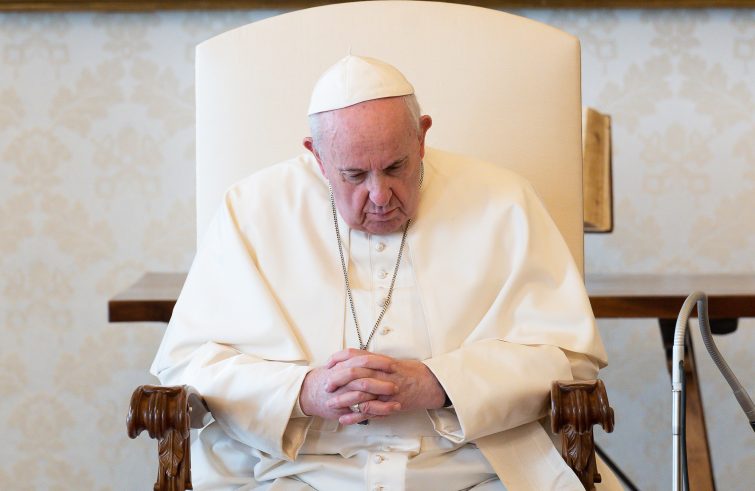
“When we pray, we never do so alone: even if we do not think about it, we are immersed in a majestic river of invocations that precedes us and proceeds after us”, the Pope said in today’s general audience live streamed from the Library of the Apostolic Palace, devoted to the connection between prayer and the communion of saints.
“Those prayers that are good are ‘expansive’, like anything that is good; they propagate themselves continuously, with or without being posted on social networks”, the image chosen by Francis: “from hospital wards, from moments of festive gatherings to those in which we suffer silently… One person’s pain is everyone’s pain, and one person’s happiness is transmitted to someone else’s soul. Stories that create the story of one’s own life.”
“Prayer is always born again”, the Pope assured: “each time we join our hands and open our hearts to God, we find ourselves in the company of anonymous saints and recognized saints who pray with us and who intercede for us as older brothers and sisters who have preceded us on this same human adventure. There is no grief in the Church that is borne in solitude, there are no tears shed in oblivion, because everyone breaths and participates in one common grace.” “It is no coincidence that in the ancient church people were buried in gardens surrounding a sacred building, as if to say that, in some way, the hosts of those who have preceded us participate in every Eucharist”, Francis remarked:
“Our parents and grandparents are there, our godfathers and godmothers are there, our catechists and other teachers are there…”
The saints are still here not far from us; and their representations in churches evoke that ‘cloud of witnesses’ that always surrounds us”, the Pope said: “They are witnesses that we do not adore – that is understood that we do not adore these saints – but whom we venerate and who in thousands of different ways bring us to Jesus Christ, the only Lord and Mediator between God and humanity.”
“A ‘saint’ that does not bring you to Jesus is not a saint, not even a Christian”,
Francis emphasized: “The saints remind us that even in our lives, however weak and marked by sin, holiness can unfold. Even at the last moment.” “In fact, we read in the Gospel that the first saint canonized by Jesus Himself was a thief.” Francis added in unprepared remarks: “he was canonized not by the Pope but by Jesus himself.” “Holiness is a journey of life, a long or short or instantaneous encounter with Jesus.” “It is never too late to be converted to the Lord who is good and great in love.”
“There is a mysterious solidarity in Christ – Francis pointed out – between those who have already passed to the other life and we pilgrims in this one: from Heaven, our beloved deceased continue to take care of us.
They pray for us, and we pray for them”, explained the Pontiff: “The first way to pray for someone is to speak to God about him or her.” “If we do this frequently, each day, our hearts are not closed but open to our brothers and sisters. To pray for others is the first way to love them and it moves us toward concretely drawing near.” “Even in conflictual moments”, he assured:
“a way of dissolving the conflict, of softening it, is to pray for the person with whom I am in conflict. And something changes with prayer. The first thing that changes is my heart and my attitude. The Lord changes it so it might be turned into an encounter, a new encounter so that the conflict does not become a never-ending war.”
“The first way to face a time of anguish is by asking our brothers and sisters, the saints above all, to pray for us”, Francis’ invitation: “If the trials of life have not reached the breaking point, if we are still capable of persevering, if despite everything we proceed trustingly, more than due to our own merits, perhaps we owe all this to the intercession of all the saints, some who are in Heaven, others who are pilgrims like us on earth, who have protected and accompanied us”, the Pope said, concluding the catechesis:
“because all of us know there are holy people here on this earth, saintly men and women who live in holiness. They do not know it; neither do we know it. But there are saints, everyday saints, hidden saints, or as I like to say, ‘saints who live next door’”










